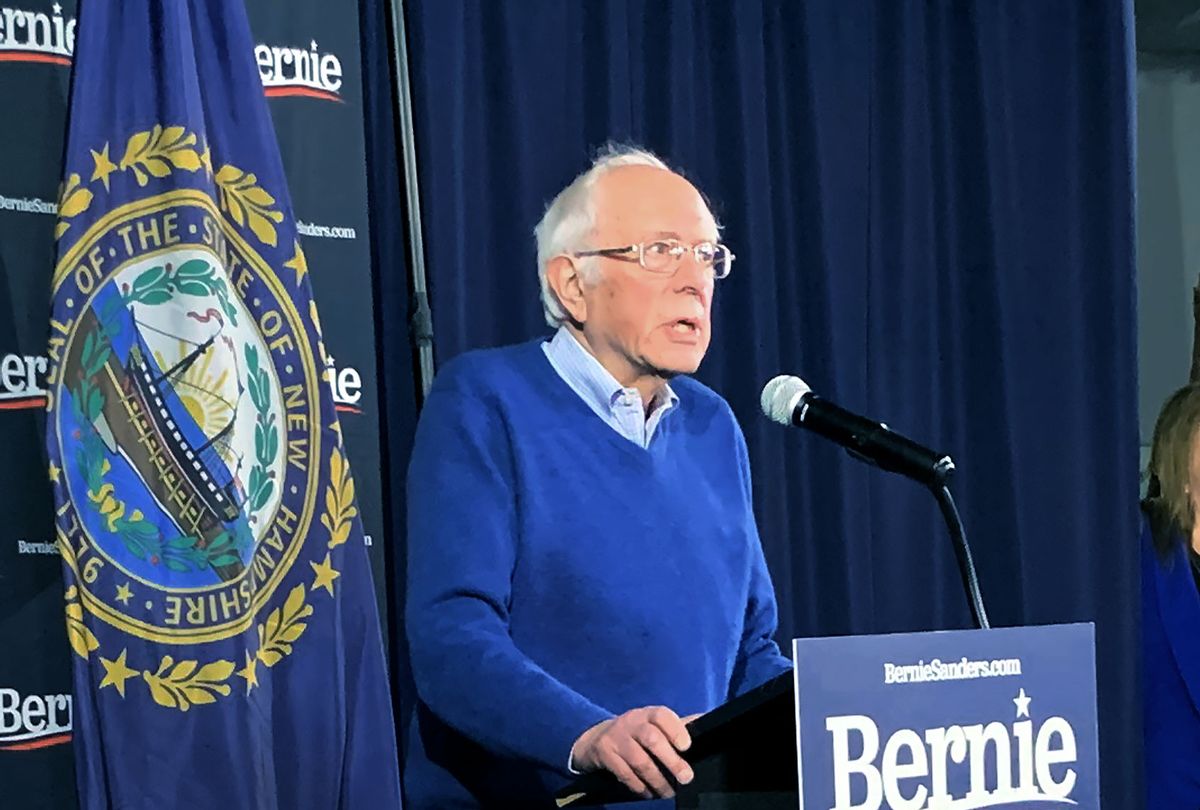It was billed as a victory speech, but Sen. Bernie Sanders of Vermont was still cranky. He was here to tell the press that he had won the Iowa caucuses, but also that his victory there was still being denied.
"More Iowans came out on caucus night to support our candidacy than the candidacy of anyone else," he told a crowd of reporters gathered at his New Hampshire campaign's headquarters in Manchester. "And when 6,000 more people come out for you in an election than your nearest opponent, we here in northern New England call that a victory."
He didn't mention that opponent by name, but he clearly had in mind Pete Buttigieg, the former mayor of South Bend, Indiana. Buttigieg had pulled an unexpectedly high number of votes from caucus-goers in the Hawkeye State last week, putting the upstart candidate just slightly ahead of Sanders in the race for state delegates. (Although as Sanders said, he got more first-preference votes.)
The situation in Iowa keeps getting uglier. The caucus results were delayed by days, due to the failure of a complicated new system, put in to satisfy demands for transparency by Sanders and his supporters after the 2016 caucuses — plus a shiny but apparently broken new smartphone app to tabulate results, put in place to please the tech-bamboozled consulting crowd of the Democratic party.
Since then, conspiracy theories have been flying around the internet. A couple of campaigns, most notably those of Sanders and former Vice President Joe Biden, have lashed out angrily at the Iowa Democratic party. Biden has been particularly salty, as he came in a distant fourth, after the past two frontrunners and an unexpectedly strong showing from Sen. Elizabeth Warren of Massachusetts.
In response, Democratic National Committee head Tom Perez declared that "enough is enough" and asked the Iowa Democrats to "immediately begin a recanvas" to "assure public confidence in the results." This failed to improve the situation, only stoking more online conspiracy theories about an effort by shadowy elites seeking to tarnish or steal Sanders's victory.
But Sanders had plenty of salt to share on Thursday, getting into a detailed, technical argument about why he believes the Buttigieg-favoring numbers touted by many media outlets (which relies on "state delegate equivalents") should be cast aside in favor of the raw vote total. The "6,000" number Sanders is touting comes from the first round of caucus voting, not the last round, in which people who supported low-performing first-choice candidates move to their second choice. On that final vote tally, the difference between Sanders and Buttigieg was more modest — about a 2,600-vote edge for Sanders, according to the final total.
If Sanders was annoyed, he had reason to be. He may have indulged in some flattering numerical cherry-picking, but the truth is that he and Buttigieg were virtually even in the Iowa caucuses — but the media is treating Buttigieg like the big winner.
This is likely due to the fact that Buttigieg's win was so unexpected, which creates a "momentum" narrative in the press. There's a not-small chance that the self-fulfilling prophecy factor kicks in, and because Buttigieg is getting more flattering media attention, he will also be able to raise more money, which could turn, lead to wins down the road. No wonder Sanders — who did, in fact, get more votes — was a bit cranky.
Sanders certainly had good fundraising news of his own on Thursday, announcing a haul of $25 million in January alone — more money than any other Democratic candidate has raised in any individual quarter. Buttigieg's media frontrunner status was evident, however in an event held shortly after the Sanders press conference, at an American Legion hall in the village of Merrimack. Buttigieg, who served in Afghanistan, planned on focusing on veterans issues, but the crush of media and actual voters who showed up completely overwhelmed the small facility.
I was almost in the door at the event when Mayor Pete's panicked campaign staff realized there was no possible way they were getting many more people in and shut the door. For about 15 minutes, staffers kept reassuring the fractious journalists shut outside that they were trying to resolve the situation. It soon became evident that they were running down the line and grabbing the famous cable news anchors who were in the clamoring mob, as well as some veterans who were actually there to participate in the event.
After watching a couple of disabled veterans struggle to get past the throng of pushy reporters and photographers, I decided to choose my own moral code over the quickly dimming hope that the Buttigieg staff would run out of the likes of Chris Matthews and Katy Tur to let in before me, and took off.
But the whole situation ended up proving the point anyway: Buttigieg is the shiny new object. And Sanders, who got slightly more votes, is not happy about it.
"Well, from where I come from, and where everybody else comes from, the person who gets the most votes wins," he said. "We got the most votes." As he noted in this victory speech, if he keeps that up, it won't much matter who "won" the Iowa caucuses, since Sanders will win the Democratic nomination.



Shares